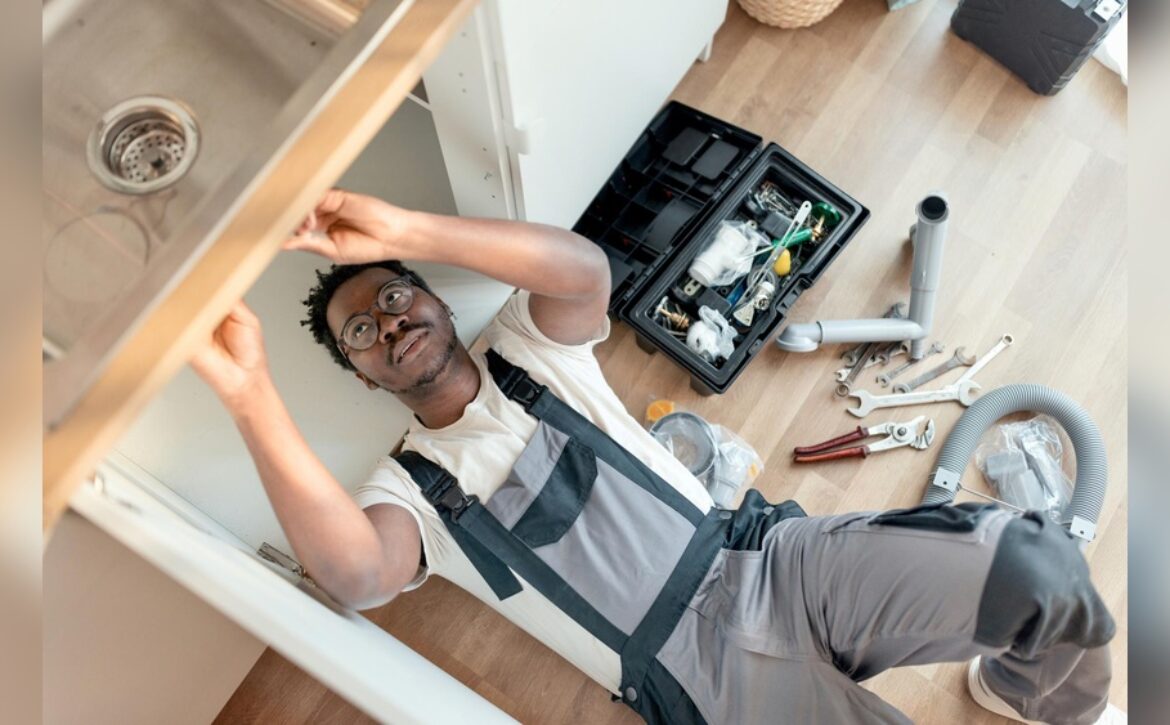
How to Become a Professional Plumbing Course: Expert Guide
Imagine having a career where you can solve problems, help people, and earn a great living. Becoming a professional plumber offers just that.
If you’re curious about what it takes to dive into this essential and rewarding profession, you’re in the right place. This article is your roadmap to understanding how to enroll in a professional plumbing course that will equip you with the skills and knowledge needed to succeed.
You’ll discover step-by-step guidance, insider tips, and the secrets of the trade that can set you apart from the competition. Whether you’re looking for a career change or starting fresh, this guide will help you make informed decisions and take confident steps toward a successful plumbing career. So, why wait? Let’s explore how you can turn your ambition into expertise.
Choosing The Right Plumbing Course
Selecting the ideal plumbing course involves understanding your career goals and learning style. Explore programs offering hands-on training and certifications. Compare course durations, fees, and instructors to ensure quality education.
Choosing the right plumbing course is crucial to jumpstart your career as a professional plumber. With so many options available, making the right choice can seem daunting. However, by focusing on key factors such as accreditation, learning format, and costs, you can find a course that suits your needs and goals.
Accredited Programs
Accreditation is a stamp of quality assurance for any educational program. It ensures that the course meets industry standards and provides the skills required for a successful plumbing career. Always check whether the program is recognized by relevant trade organizations or educational bodies. An accredited course not only boosts your resume but also increases your chances of landing a job. Employers often prefer candidates who have completed certified programs. It’s worth spending a little extra time to verify a program’s accreditation before enrolling.
Online Vs In-person Learning
Online learning offers flexibility, making it ideal if you have a busy schedule or live far from a training center. You can study at your own pace and access course materials anytime. However, plumbing is a hands-on trade, and practical experience is invaluable. In-person classes provide immediate access to tools, real-world scenarios, and expert guidance. If you thrive in a classroom setting and enjoy direct interaction, this might be the better option. Consider your personal learning style and commitments when deciding between online and in-person courses.
Course Duration And Costs
Plumbing courses vary in length, typically ranging from a few weeks to several months. Shorter courses might cover only the basics, while longer programs offer more in-depth knowledge and practical skills. Think about how quickly you want to enter the workforce. Cost is another important factor. While some courses might seem expensive, consider them an investment in your future. Compare different programs and see what’s included in the tuition—materials, exam fees, and certification can all add to the total cost. Choosing the right plumbing course requires careful consideration of these factors. It’s a decision that can shape your career, so take the time to research and reflect on what matters most to you. What kind of learning experience do you envision for yourself?

Essential Skills For Plumbers
Becoming a professional plumber requires more than just knowing how to fix a leak or unclog a drain. It demands a set of essential skills that can transform a simple task into a rewarding career. These skills are not just about handling tools; they’re about solving problems, communicating effectively, and mastering technical proficiencies. Whether you’re just starting out or looking to refine your abilities, these skills are your ticket to success in the plumbing world.
Technical Proficiency
Technical proficiency is the backbone of plumbing. You need to understand how systems work, from water heaters to complex pipe networks. This means being comfortable with tools and technologies, staying updated with industry standards, and continuously learning. Imagine fixing a boiler without knowing its mechanics—that’s a recipe for disaster. Invest time in hands-on practice and seek opportunities to learn new techniques. Consider enrolling in workshops that offer the latest insights.
Problem-solving Abilities
Plumbing often throws unexpected challenges your way. You might face a situation where a pipe bursts in a tricky location. Your ability to think on your feet and craft solutions quickly is crucial. Problem-solving isn’t just about fixing the immediate issue; it’s about preventing future ones. Develop a mindset that views challenges as opportunities to innovate. Sharpen your skills by tackling diverse projects, each with unique obstacles to overcome.
Communication Skills
Effective communication is a cornerstone in plumbing. Clients need to understand what you’re doing and why. This isn’t just about talking; it’s about listening to concerns and explaining solutions clearly. Imagine a client confused about why a repair costs more than expected. Your ability to convey information can build trust and satisfaction. Practice your communication skills by explaining complex ideas simply. Seek feedback from clients to refine your approach.
As you venture into the plumbing profession, ask yourself: How can you leverage these skills to not only solve problems but to elevate your career? These skills are not just tools—they’re your partners in success.
Certification And Licensing
Becoming a professional plumber requires dedication and skill. Certification and licensing are critical steps in your journey. They ensure you meet industry standards and regulations. These credentials open doors to better job opportunities and client trust. Understanding the requirements and processes is essential for success.
State Requirements
Each state has its own plumbing rules. Understanding these is crucial. Requirements may include specific training hours. Some states need you to complete an apprenticeship. Others may require a written exam. Knowing these details helps you plan your career path effectively.
Exam Preparation Tips
Preparing for your plumbing exam is vital. Focus on key topics like codes and safety. Practice with sample questions. Study regularly to build confidence. Consider joining study groups for extra support. Use resources like online tutorials and guides. Staying organized is crucial for success.
Maintaining Licenses
Once licensed, keeping it active is important. Regular renewals are often necessary. Some states require continuing education. This ensures you stay updated with new methods. Keeping your license valid maintains your professional credibility. It also shows your commitment to the trade.
Hands-on Training
Embarking on the journey to become a professional plumber requires more than just theoretical knowledge. Hands-on training is crucial in mastering the craft, as it bridges the gap between learning concepts and applying them in real-world scenarios. This practical approach allows you to gain invaluable skills and confidence, setting you apart in the competitive plumbing industry.
Apprenticeship Opportunities
Apprenticeships are a golden ticket to hands-on training. They immerse you in the daily life of a plumber, exposing you to various tasks and challenges. You’ll learn how to fix leaks, install piping systems, and troubleshoot issues on the job.
These opportunities also provide a steady income while you train, making it easier to sustain yourself. Many plumbing companies offer apprenticeship programs, so reach out to local businesses and inquire about openings. Ask yourself: would you rather study plumbing from a textbook or dive straight into fixing a broken pipe?
Finding Mentorship
A mentor can be your guiding light in the plumbing world. They offer valuable insights, share personal experiences, and help you navigate complex situations. A seasoned plumber can teach you tricks of the trade that textbooks might overlook.
Look for mentors during your apprenticeship or through professional networks. They can help you understand the nuances of plumbing and provide advice on career advancement. Consider how a mentor’s experience could shape your journey.
Importance Of Real-world Experience
Real-world experience is where theory meets practice. It’s one thing to read about fixing a sink, but entirely another to tackle the problem head-on. You’ll develop problem-solving skills that are crucial for any professional plumber.
Hands-on experience prepares you for unexpected challenges, ensuring you’re ready for anything. Each task you complete builds your confidence and expertise. Ask yourself: are you ready to face real-world plumbing challenges with assurance?
Career Advancement
Advancing your career as a professional plumber is not just about honing technical skills. It’s about seizing opportunities that can transform your career from a job into a thriving business. Whether you dream of specializing in a niche or starting your own plumbing company, there are numerous paths for growth. Are you ready to take your plumbing career to the next level?
Specialization Options
Choosing a specialization can set you apart in the plumbing world. Consider areas like green plumbing, which focuses on sustainable water systems, or pipefitting for industrial clients. These niches often command higher fees and open doors to unique projects. Specializing can boost your credibility and make you the go-to expert in your chosen field.
Think about what excites you in plumbing—maybe it’s working with cutting-edge technologies or solving complex water systems. Pursuing specialized certifications will enhance your skills and make your work more fulfilling. Plus, specialization can lead to networking opportunities with industry leaders.
Starting Your Own Business
Have you ever thought about running your own plumbing business? It’s challenging but rewarding. Being your own boss means setting your schedule and choosing your projects. Start by creating a solid business plan that outlines your goals and strategies.
Invest in marketing to reach new clients and build your brand. Harnessing social media can attract local customers and showcase your expertise. Remember to focus on customer service—happy clients often refer you to others, growing your business organically.
Continuing Education
Learning doesn’t stop once you’ve become a licensed plumber. Continuing education keeps you updated with the latest industry trends and technologies. Consider enrolling in courses that teach new plumbing techniques or business management skills.
Attending workshops and seminars can expose you to innovative tools and methods. This ongoing learning can lead to efficiency improvements in your work, saving you time and money. How will you stay ahead in a constantly evolving field?
In your journey as a professional plumber, career advancement is about exploring opportunities and embracing challenges. Think about your next step and the impact it could have on your future. What path will you choose to elevate your career?
Navigating The Job Market
Becoming a professional plumber requires enrolling in a structured course. These courses teach essential skills and safety practices. Gain hands-on experience and industry knowledge to excel in the plumbing job market.
Navigating the job market as a new professional plumber can be challenging. Understanding the steps to showcase your skills effectively is key. Building a strong resume, mastering interview techniques, and employing strategic networking are essential components. Each step plays a crucial role in landing your desired plumbing job.
Resume Building
Crafting a compelling resume is your first step. Highlight your plumbing certifications clearly. Include hands-on experience from your training courses. Use bullet points for quick readability. Show your skills in problem-solving and attention to detail. Mention any relevant projects or volunteer work. Tailor your resume for each job application. Make sure it reflects the specific job requirements. Keep it concise, ideally one page.
Interview Techniques
Interviews can be nerve-wracking. Preparation helps ease anxiety. Research common plumbing interview questions. Practice answering them confidently. Dress professionally to make a good impression. Show enthusiasm and genuine interest in the role. Use clear and simple language. Listen carefully to questions and respond thoughtfully. Demonstrate your knowledge without sounding arrogant. Ask questions about company values and growth opportunities.
Networking Strategies
Networking opens doors to job opportunities. Connect with fellow students and instructors. Attend plumbing workshops and industry events. Use online platforms like LinkedIn to build connections. Participate in discussions and forums related to plumbing. Share insights and ask questions to engage others. Develop relationships with industry professionals. This can lead to valuable job referrals. Networking is about building trust and visibility.
Frequently Asked Questions
What Skills Are Needed For Plumbing?
To become a plumber, you need problem-solving skills, manual dexterity, and physical stamina. Understanding plumbing codes and blueprints is essential. Strong communication and customer service skills are also important for working with clients and teams.
How Long Is A Plumbing Course?
A typical plumbing course lasts between 6 months and 2 years. The duration depends on the program and certification level. Some courses offer accelerated options or part-time schedules to accommodate various learning needs.
What Qualifications Do Plumbers Need?
Plumbers need a high school diploma and vocational training. Completing an apprenticeship program is often required. Licensing varies by state, but passing a certification exam is generally necessary to work professionally.
Can Plumbers Work Independently?
Yes, plumbers can work independently after gaining experience and necessary certifications. Many start their own businesses or work as contractors. Being self-employed allows flexibility but requires strong business skills and client management.
Conclusion
Becoming a professional plumber takes dedication and hard work. Start with a good plumbing course. Learn the basics and practice often. Always stay curious and ask questions. Gain hands-on experience through apprenticeships. They are invaluable. Keep up with new tools and techniques.
Your skills will improve over time. Patience and persistence are key. Build connections in the industry. Networking can open many doors. Remember, every expert was once a beginner. Stay committed, and success will follow. Ready to take the plunge? Your plumbing career awaits!





